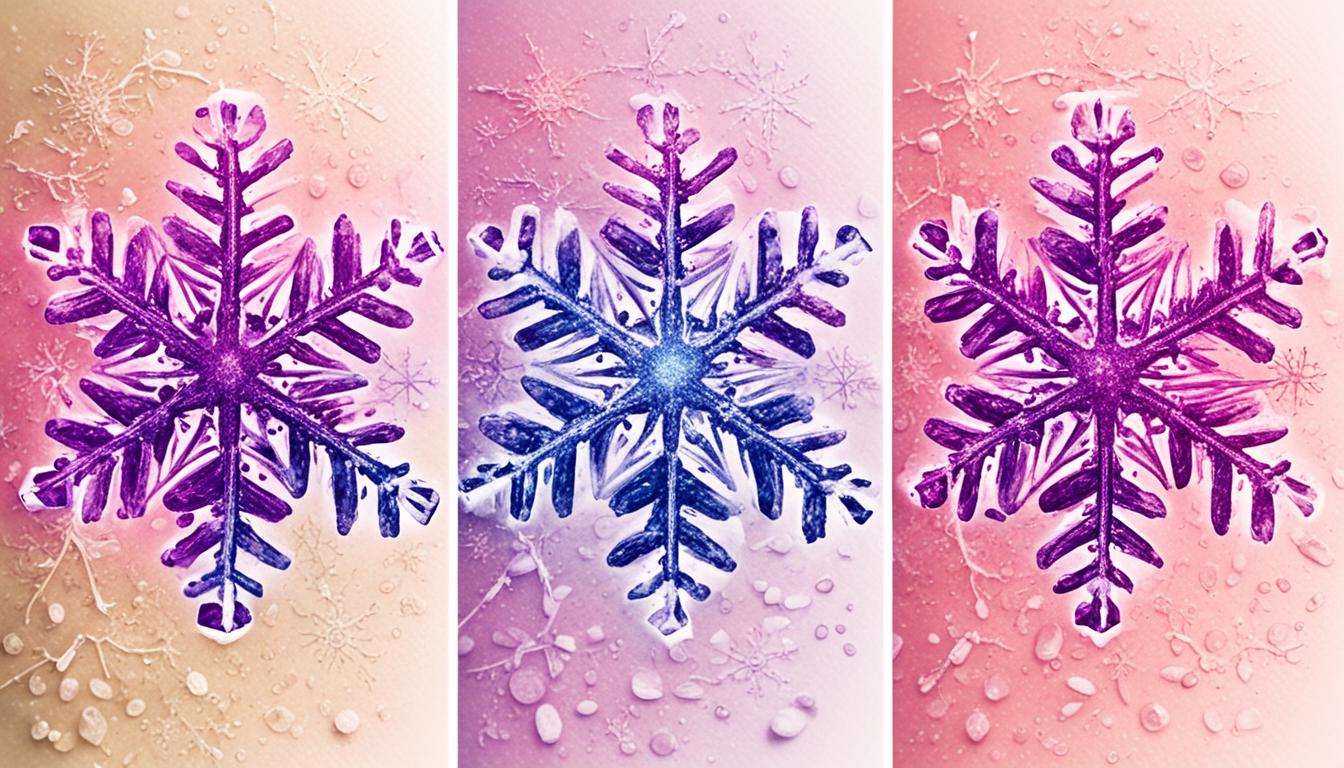Cold urticaria makes your skin have hives, itch, and swell when it’s cold. Anyone can get it, but it’s more likely in cold places. The exact cause isn’t always known. Sometimes, the skin reacts too much to the cold. Or, it might be because of a virus or a problem with the immune system. You may also get other symptoms like trouble breathing or stomach issues, along with the skin problems.
Doctors check for cold urticaria using an ice cube or special tests. For the ice cube test, they place one on your skin. If you get a red bump or rash when the skin warms up, the test is positive. There are other tests too, like the TempTest, that help figure out how severe it is or what exactly causes your reaction to cold.
To deal with cold urticaria, you can try to not get too cold, use antihistamines, or think about stem cell treatment in bad cases. Stem cell treatment is about fixing the immune system and lowering swelling. It might help reduce cold urticaria for a long time.
Key Takeaways:
- Cold urticaria makes the skin get hives, itch, and swell in the cold.
- Doctors diagnose it by putting an ice cube on the skin or doing other tests.
- You can avoid getting too cold, use antihistamines, or try stem cell therapy if it’s really bad.
- It can happen to kids or grown-ups and is more likely in cold places.
- Other symptoms like trouble breathing or stomach issues can come with a skin reaction to cold.
Cold Urticaria Symptoms and Diagnosis
Cold urticaria happens when your skin meets cold air or water. This can lead to symptoms that vary from slight to serious. You might see a red, raised rash, hives, when it’s cold. Intense itching and discomfort also occur.
Your hands or lips might get bigger than normal. In severe cases, the throat can swell up. This makes breathing tough.
Symptoms usually come when the skin warms back up. As the skin rewarms, the body’s reaction can make the symptoms worse. This causes more discomfort.
Diagnosing cold urticaria needs different tests. The ice cube challenge is common. During this, an ice cube is put on the skin briefly. The doctor watches for a specific reaction. A red bump with an area of redness around it shows a positive test. This means cold urticaria is likely.
Other tests like TempTest might also be done. These help see how bad the problem is and what might trigger it. The goal is to understand the issue and plan treatment that fits.
Image: Cold Urticaria Symptoms
Cold Urticaria Causes and Risk Factors
The exact cause of cold urticaria is often unknown. But, several factors can add to its development. Primary cases have no clear cause. Secondary cases might be linked with internal diseases like hepatitis C, or autoimmune diseases. They could also be due to and lymphoreticular malignancies. In some cases, 1-5%, cryoproteins cause cold urticaria. These are abnormal proteins linked with certain infections, autoimmune diseases, and some drugs. Cold urticaria can be inherited due to mutations in the NLRP-3 gene. People living in cold places, women, and atopic patients have a higher risk.
Internal Diseases and Cold Urticaria
If you have an internal issue like hepatitis C, it could lead to cold urticaria. Such diseases affect your immune system, making it react oddly to cold. Hepatitis C makes your body create odd proteins, called cryoglobulins, causing cold urticaria. Infectious mononucleosis can do something similar, making cryoproteins that worsen cold urticaria.
Autoimmune diseases are another risk for cold urticaria. With lupus or arthritis, your immune system may attack your own body. This can cause inflammation, upping the chance for cold urticaria. Also, diseases like lymphoma can mess with your immune system and cause cold urticaria.
Hereditary Factors and Cold Urticaria
Some cold urticaria cases run in families due to heredity. They can be tied to genetic mutations, like those in the NLRP-3 gene. This gene affects how your body reacts to cold. Mutations might cause unusual inflammatory reactions, leading to cold urticaria.
Risk Factors for Cold Urticaria
Several things can raise your chance of getting cold urticaria. Living in cold places means more exposure to cold, raising your risk. Women have a higher chance of getting cold urticaria, even though we’re not sure why yet.
Atopic people are more at risk of cold urticaria. Atopy is a genetic tendency to allergies and hypersensitivity. These people might have a stronger immune reaction to cold, leading to cold urticaria.
Knowing these causes and risks is crucial. It helps people spot and deal with cold urticaria symptoms well. With this knowledge, doctors can choose treatments that work best for cold urticaria patients, improving their quality of life.
Cold Urticaria Treatment Options and Stem Cell Therapy
The goal of treating cold urticaria is to manage its symptoms and avoid severe reactions. One way is to stay away from cold air or water. Another is to dress warmly in cold weather and avoid cold drinks and food. These steps help lower the risk of having a reaction.
Doctors often recommend antihistamines to ease cold urticaria symptoms like itching and hives. While they can help many people, antihistamines might not stop anaphylaxis. This dangerous reaction can happen if you swim in cold water.
For severe cases not helped by usual treatments, stem cell therapy may be an option. This therapy is designed to calm the immune system down and cut inflammation. It offers hope for lasting relief and a better life for patients.
The key is to treat urticaria effectively, manage cold urticaria, and use preventive steps. This way, people can reduce how much cold urticaria affects their lives. Those with tough symptoms might find relief in stem cell therapy.

